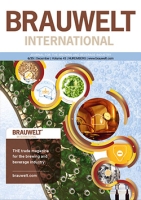The demands placed on measurement and control devices in the brewery are complex. Reliable and accurate measurements are a prerequisite for integration in an automated process. Communication between the devices must be seamlessly integrated throughout all process steps with the control processes adjusted accordingly.
The Innofill DRV filling system is available in several versions for still and carbonated beverages. It is being constantly further developed in tune with the requirements of the industry. Just recently, for example, the growing trend in the soft drinks sector towards hot filled plastic bottles has prompted integration of a new hotfill model into the system. The latest innovation is that the Innofill DRV not only operates with electromagnetic inductive flow metering but now also with volumetric flow metering for beverages with low or no electrical conductivity. The new version also allows for the handling of plastic bottles with various neck diameters.
Requirements relating to cleaning and disinfection in brewery plants have changed significantly. Apart from efficiency, parameters such as environmental protection and commercial considerations are aspects that can no longer be neglected. Löwenbrauerei Hall in Schwäbisch Hall overcame old habits and went for modern cleaning and disinfection procedures. The whole brewery was looked at from a completely different angle with the support of cleaning specialists from the Düsseldorf Ecolab company. Environment and purse say “thank you”.
Commercial utilisation of oxidation processes for removal of organic trace substances is receiving increasing attention from scientists worldwide and is attracting users from the most diverse sectors. Ozone is still rarely used in the food and consumables industry. As an alternative
Medella Light is the main brand produced by the only brewery in Puerto Rico: Cervecería India. Cervecería is considered one of the most up-to-the-minute breweries in Latin America operating under the American flag. It was recently modernized on a huge scale, with new buildings, a new brewhouse, and new plant equipment. Craig Hylwa, Operations Team Leader at Cervecería India, set high quality standards: As regards the new investment in filling and packaging technology he went for KHS technology in the fields of canning, glass bottling and keg filling systems.
This research project (AiF ZN 210) investigated how material surface (e.g. due to topography or surface energy), quantity of deposits and cleaning agent affect the success of cleaning. In this article, the status of investigations and parameters important for cleaning of material surfaces are described.
Beverage hose lines are widely used in breweries. It is, however, necessary to exercise care in selecting hose and fittings and in cleaning and disinfection. Willi Emde, Industrial Hoses Product and Market Segment Manager at ContiTech Fluid, Hanover, emphasised that this should be taken into account in the context of a plant HACCP concept.
A previous publication showed that there were possibilities for optimisation of monitoring chlorine dioxide usage as well as formation of chlorite disinfectant by-product in commercial operations [1]. This article describes investigations relating to removal of residual chlorine dioxide and removal of chlorite from water using activated carbon or ultraviolet radiation so as to utilise optimisation potentials in commercial operations.
A number of methods are currently available for disinfecting water from wells and municipal supplies for utilization as process water in food production facilities. Ozonation using the ESAZON® system offers completely new possibilities in the area of water disinfection. The system has been tested on-site for almost two years in mid-sized breweries. The results show that this method provides effective protection for all production areas against water-borne microbes introduced from external sources.
The Lao Brewery, Vientiane/Laos with an annual output of 1.2 million hl beer has a market share of 99 percent in Laos. The lately installed state-of-the-art filling technology will be described in this contribution, which will also provide information on the Laotian beer market. With a per capita consumption of 20 liters per year it has quite a potential.
At the end of last year, the Dutch brewery Bavaria N. V. started using the prototype of a bottle cleaning machine which had been jointly developed by Krones and Bavaria Lieshout – the Lavatec KD 2005. With the new machine, it was hoped that the cleaned reusable glass bottles would leave the machine consistently sterile and ready to be filled with beverages, and that operating costs would be substantially reduced thanks to a simultaneous reduction in the consumption of energy, water and chemicals.


